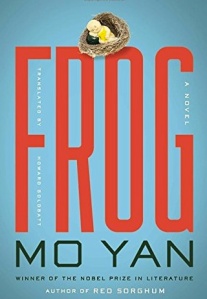 In Literary Prowess Lost, we have one of the first coherent — and highly critical — reviews of a modern novel translated from the Chinese in which the reviewer knows the source language and doesn’t shirk from calling out the translator on several points:
In Literary Prowess Lost, we have one of the first coherent — and highly critical — reviews of a modern novel translated from the Chinese in which the reviewer knows the source language and doesn’t shirk from calling out the translator on several points:
Without multiple translations of the same work, it’s impossible to adequately evaluate the author. To what extent Mo Yan writes in clichés or to what extent it’s a tic of the translator is not a judgment call that the average reader can make. This means that placing him alongside authors such as Gabriel Garcia Marquez, Kundera, and Haruki Murakami is difficult. Although all of the authors are themselves presented to an Anglophone audience in translation, there are at least multiple translations available. In the case of Kundera, the imprecision of translation drove him to such despair that he spent years correcting the translations of his own work into the four languages he can read.
Both Mo Yan and Marquez have received the Nobel Prize for literature, while Kundera and Murakami are regularly tapped as potential winners (Murakami was odds on favorite to win the 2014 prize according to the British bookmaker Ladbrokes). What is important to note is that unlike the other denizens of magical realism, we only ever see Mo Yan’s work through the prism of Howard Goldblatt. In that case, it seems unfair to make a comparison and to evaluate his oeuvre. As Goldblatt himself noted in an interview with The LA Review of Books, “What the reader has in her hands is a facsimile of the original work.” We should therefore see multiple facsimiles, and then we can decide on Mo Yan’s true place within literature.
Literature is important in providing nuanced and divergent interpretations of a country so often rendered in stark black and white terms. Translating a country as vast and diverse as China to a wider audience may be Sisyphean, or it may be 精卫填海 (Jiangweitianhai) or like a bird trying to fill the ocean with pebbles. Perhaps the most important thing we can learn from the plurality of voices emerging from China today is not what separates our cultures, but how ontologically similar they are. For every Sisyphus and his bolder, there is a 精卫 and his pebbles.
It’s thus a sad systemic irony that many great novels from contemporary China, which are so crucial in providing a sounding board for the diversity of the Chinese experience, suffer from being the sole preserve of one translator. Until the field opens dramatically, much of what is being said will be lost in translation.
As they say in Wikipedia: “Not finding what you want? Go fix it.” I hope you’ll be able to translate more such works.
LikeLike
@Berlin Thanks for the encouragement, Berlin!
I harbor no illusions about my own modest ability to translate Chinese literature, however, and sincerely feel that Goldblatt deserves plenty of kudos for bringing so many works of contemporary literature to readers throughout the world.
The reasons I cited this review are these: The author calls attention to the fact that “Frog” is a translation, names the translator, and discusses the impact of the translator’s choices on his work. I think we need more examples of this, instead of the current approach where the reviewer tends to be monolingual and sometimes even neglects to mention the translator!
Additionally, I heartily agree that often-translated authors would be better served appearing in various “guises,” i.e., if their texts were rendered by more than one translator. I was elated to see that a few years back the Lin Shaohua (林少华) monopoly on Murakami Haruki ended abruptly, and including versions from Taiwan, there are now at least three translators of Murakami into Chinese. I found Lin Shaohua’s “voice” virtually unreadable . . .
LikeLike